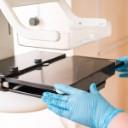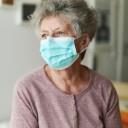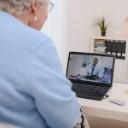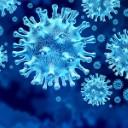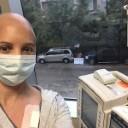-
The Pandemic’s Impact on Cancer Screening and Detection
Delays in cancer screening and diagnosis due to the COVID-19 pandemic put people at risk.
by Kevin McLaughlin
-
The Return to Work
What happens if your workplace reopens before you're ready to return or you're an essential worker? For some people who have been diagnosed with cancer, accommodations may be possible.
by Jen Tota McGivney
-
Treating Cancer Patients With COVID-19: A New York City Experience
An analysis of cancer patients who were infected with the coronavirus and treated at Memorial Sloan Kettering Cancer Center in New York City suggests certain risk factors may predict more severe COVID-19.
by Anna Azvolinsky
-
COVID-19 Exposes Health Inequities
At a symposium held during a virtual meeting of cancer researchers, panelists discussed the disproportionate impact COVID-19 has had on Black and Latino Americans, as well as members of other minority groups.
by Kevin McLaughlin
-
Cancer Care Moves Forward Amid COVID-19
Following the arrival of the coronavirus in the U.S., people with cancer and their doctors are adjusting to new ways of doing things while continuing to seek and provide cancer care.
by Kate Yandell
-
Trials Interrupted
COVID-19 slowed or stopped enrollment in some cancer clinical trials.
by Kate Yandell
-
Registries Report on COVID-19 and Cancer
Data shed light on risk factors for death among people with cancer infected with the coronavirus.
by Kate Yandell
-
When COVID-19 Comes Home
I have brain cancer, and my wife is a health care worker. These are some questions we had to consider leading up to and after her diagnosis with COVID-19.
by Adam Hayden
-
International Perspectives on COVID-19 and Cancer
Researchers from around the globe share insights into the outcomes of people with cancer who are infected with the coronavirus.
by Bradley Jones
-
Facing Cancer and a Pandemic at the Same Time
Cancer patients and their families share stories of fear, love and uncertainty as they find new ways to support each other.
by Jen Tota McGivney
Cancer Talk
Treatment Combination Improves Survival in EGFR-positive Lung Cancer
Adding chemotherapy to targeted therapy improves outcomes for people with advanced EGFR-positive non-small cell lung cancer.
by Sandra Gordon
Lessons From 20 Years Living With CancerMultiple myeloma survivor Jonathan Gluck reflects on uncertainty, and the scientific progress that has kept him living with cancer for more than two decades.
by Eric Fitzsimmons
The Enduring Importance of Cancer Disparities ResearchOpening session from AACR conference highlights how perseverance and adversity have informed cancer disparities research over the years.
by Eric Fitzsimmons
Most Cancer Survivors Don’t Meet Healthy Diet GoalsDespite research linking fruits and vegetables to cancer survival, many people do not change their eating habits after diagnosis.
by Darlene Dobkowski

